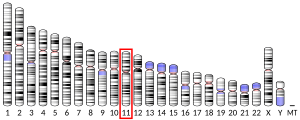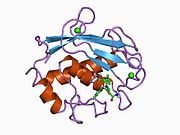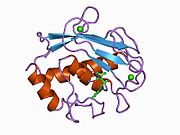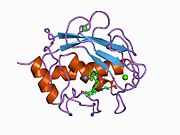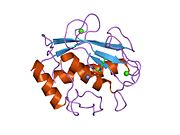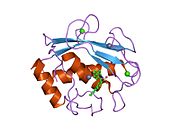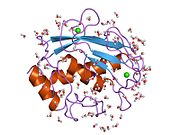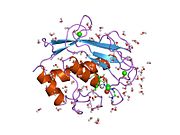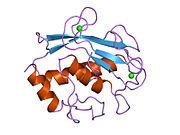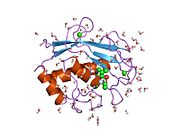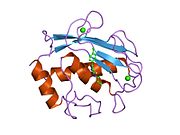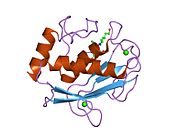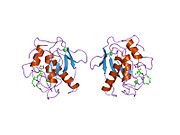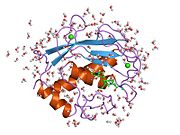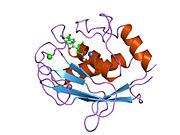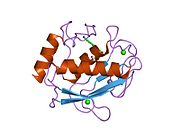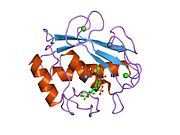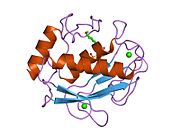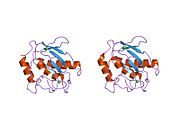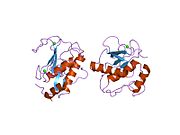MMP8
Neutrophil collagenase, also known as matrix metalloproteinase-8 (MMP-8) or PMNL collagenase (MNL-CL), is a collagen cleaving enzyme which is present in the connective tissue of most mammals.[5] In humans, the MMP-8 protein is encoded by the MMP8 gene.[6][7] The gene is part of a cluster of MMP genes which localize to chromosome 11q22.3.[5] Most MMP's are secreted as inactive proproteins which are activated when cleaved by extracellular proteinases. However, the enzyme encoded by this gene is stored in secondary granules within neutrophils and is activated by autolytic cleavage.
Function
Proteins of the matrix metalloproteinase (MMP) family are involved in the breakdown of extracellular matrix in normal physiological processes, such as embryonic development, reproduction, and tissue remodeling, as well as in disease processes, such as arthritis and metastasis. The primary function of MMP-8 is the degradation of type I, II and III collagens. In cancer, loss of MMP-8 in the murine MMTV-PyMT breast cancer model has been associated with increased tumor growth and metastatic burden, as well as enhanced tumor vascularity and altered immune cell infiltration.[8] Furthermore, analysis of MMP-8 in breast cancer cell lines revealed a causal connection between MMP-8 activity and IL6 and IL8 production, suggesting a role for MMP-8 in the regulation of the innate immune system.[9]
References
- ^ a b c GRCh38: Ensembl release 89: ENSG00000118113 – Ensembl, May 2017
- ^ a b c GRCm38: Ensembl release 89: ENSMUSG00000005800 – Ensembl, May 2017
- ^ "Human PubMed Reference:". National Center for Biotechnology Information, U.S. National Library of Medicine.
- ^ "Mouse PubMed Reference:". National Center for Biotechnology Information, U.S. National Library of Medicine.
- ^ a b "Entrez Gene: MMP8 matrix metallopeptidase 8 (neutrophil collagenase)".
- ^ Hasty KA, Pourmotabbed TF, Goldberg GI, Thompson JP, Spinella DG, Stevens RM, Mainardi CL (July 1990). "Human neutrophil collagenase. A distinct gene product with homology to other matrix metalloproteinases". J. Biol. Chem. 265 (20): 11421–4. doi:10.1016/S0021-9258(19)38413-3. PMID 2164002.
- ^ Devarajan P, Mookhtiar K, Van Wart H, Berliner N (June 1991). "Structure and expression of the cDNA encoding human neutrophil collagenase". Blood. 77 (12): 2731–8. doi:10.1182/blood.V77.12.2731.2731. PMID 1646048.
- ^ Decock, Julie; Hendrickx, Wouter; Thirkettle, Sally; Gutiérrez-Fernández, Ana; Robinson, Stephen D; Edwards, Dylan R (2015). "Pleiotropic functions of the tumor- and metastasis-suppressing matrix metalloproteinase-8 in mammary cancer in MMTV-PyMT transgenic mice". Breast Cancer Res. 17 (1): 38. doi:10.1186/s13058-015-0545-8. PMC 4380014. PMID 25848906.
- ^ Thirkettle, Sally; Decock, Julie; Arnold, Hugh; Pennington, Caroline J; Jaworski, Diane M; Edwards, Dylan R (2013). "Matrix metalloproteinase 8 (collagenase 2) induces the expression of interleukins 6 and 8 in breast cancer cells". J Biol Chem. 288 (23): 16282–16294. doi:10.1074/jbc.M113.464230. PMC 3675567. PMID 23632023.
Further reading
- Chandler S, Miller KM, Clements JM, et al. (1997). "Matrix metalloproteinases, tumor necrosis factor and multiple sclerosis: an overview". J. Neuroimmunol. 72 (2): 155–61. doi:10.1016/S0165-5728(96)00179-8. PMID 9042108. S2CID 26495949.
- Massova I, Kotra LP, Fridman R, Mobashery S (1998). "Matrix metalloproteinases: structures, evolution, and diversification". FASEB J. 12 (25n26): 1075–95. CiteSeerX 10.1.1.31.3959. doi:10.1142/S0217984998001256. PMID 9737711.
- Nagase H, Woessner JF (1999). "Matrix metalloproteinases". J. Biol. Chem. 274 (31): 21491–4. doi:10.1074/jbc.274.31.21491. PMID 10419448.
- Bläser J, Triebel S, Reinke H, Tschesche H (1992). "Formation of a covalent Hg-Cys-bond during mercurial activation of PMNL procollagenase gives evidence of a cysteine-switch mechanism". FEBS Lett. 313 (1): 59–61. Bibcode:1992FEBSL.313...59B. doi:10.1016/0014-5793(92)81184-N. PMID 1330697. S2CID 36829374.
- Devarajan P, Mookhtiar K, Van Wart H, Berliner N (1991). "Structure and expression of the cDNA encoding human neutrophil collagenase". Blood. 77 (12): 2731–8. doi:10.1182/blood.V77.12.2731.2731. PMID 1646048.
- Bläser J, Knäuper V, Osthues A, et al. (1992). "Mercurial activation of human polymorphonuclear leucocyte procollagenase". Eur. J. Biochem. 202 (3): 1223–30. doi:10.1111/j.1432-1033.1991.tb16494.x. PMID 1662606.
- Knäuper V, Krämer S, Reinke H, Tschesche H (1990). "Characterization and activation of procollagenase from human polymorphonuclear leucocytes. N-terminal sequence determination of the proenzyme and various proteolytically activated forms". Eur. J. Biochem. 189 (2): 295–300. doi:10.1111/j.1432-1033.1990.tb15489.x. PMID 2159879.
- Hasty KA, Pourmotabbed TF, Goldberg GI, et al. (1990). "Human neutrophil collagenase. A distinct gene product with homology to other matrix metalloproteinases". J. Biol. Chem. 265 (20): 11421–4. doi:10.1016/S0021-9258(19)38413-3. PMID 2164002.
- Knäuper V, Krämer S, Reinke H, Tschesche H (1990). "Partial amino acid sequence of human PMN leukocyte procollagenase". Biol. Chem. Hoppe-Seyler. 371 Suppl: 295–304. PMID 2169256.
- Knäuper V, Krämer S, Reinke H, Tschesche H (1990). "Partial amino-acid sequence of human PMN leukocyte procollagenase". Biol. Chem. Hoppe-Seyler. 371 (8): 733–734. doi:10.1515/bchm3.1990.371.2.733. PMID 2169766.
- Mallya SK, Mookhtiar KA, Gao Y, et al. (1991). "Characterization of 58-kilodalton human neutrophil collagenase: comparison with human fibroblast collagenase". Biochemistry. 29 (47): 10628–34. doi:10.1021/bi00499a008. PMID 2176876.
- Stams T, Spurlino JC, Smith DL, et al. (1995). "Structure of human neutrophil collagenase reveals large S1' specificity pocket". Nat. Struct. Biol. 1 (2): 119–23. doi:10.1038/nsb0294-119. PMID 7656015. S2CID 35458800.
- Fosang AJ, Last K, Neame PJ, et al. (1995). "Neutrophil collagenase (MMP-8) cleaves at the aggrecanase site E373-A374 in the interglobular domain of cartilage aggrecan". Biochem. J. 304 (2): 347–51. doi:10.1042/bj3040347. PMC 1137499. PMID 7998967.
- Bode W, Reinemer P, Huber R, et al. (1994). "The X-ray crystal structure of the catalytic domain of human neutrophil collagenase inhibited by a substrate analogue reveals the essentials for catalysis and specificity". EMBO J. 13 (6): 1263–9. doi:10.1002/j.1460-2075.1994.tb06378.x. PMC 394940. PMID 8137810.
- Fosang AJ, Last K, Knäuper V, et al. (1993). "Fibroblast and neutrophil collagenases cleave at two sites in the cartilage aggrecan interglobular domain". Biochem. J. 295 (1): 273–6. doi:10.1042/bj2950273. PMC 1134849. PMID 8216228.
- Reinemer P, Grams F, Huber R, et al. (1994). "Structural implications for the role of the N terminus in the 'superactivation' of collagenases. A crystallographic study". FEBS Lett. 338 (2): 227–33. Bibcode:1994FEBSL.338..227R. doi:10.1016/0014-5793(94)80370-6. PMID 8307185. S2CID 2454182.
- Thomas DB, Davies M, Peters JR, Williams JD (1993). "Tamm Horsfall protein binds to a single class of carbohydrate specific receptors on human neutrophils". Kidney Int. 44 (2): 423–9. doi:10.1038/ki.1993.260. PMID 8397318.
- Cole AA, Chubinskaya S, Schumacher B, et al. (1996). "Chondrocyte matrix metalloproteinase-8. Human articular chondrocytes express neutrophil collagenase". J. Biol. Chem. 271 (18): 11023–6. doi:10.1074/jbc.271.18.11023. PMID 8631924.
- Nakahara Y, Miyata T, Hamuro T, et al. (1996). "Amino acid sequence and carbohydrate structure of a recombinant human tissue factor pathway inhibitor expressed in Chinese hamster ovary cells: one N-and two O-linked carbohydrate chains are located between Kunitz domains 2 and 3 and one N-linked carbohydrate chain is in Kunitz domain 2". Biochemistry. 35 (20): 6450–9. doi:10.1021/bi9524880. PMID 8639592.
- Pendás AM, Santamaría I, Alvarez MV, et al. (1997). "Fine physical mapping of the human matrix metalloproteinase genes clustered on chromosome 11q22.3". Genomics. 37 (2): 266–8. doi:10.1006/geno.1996.0557. PMID 8921407.
External links


